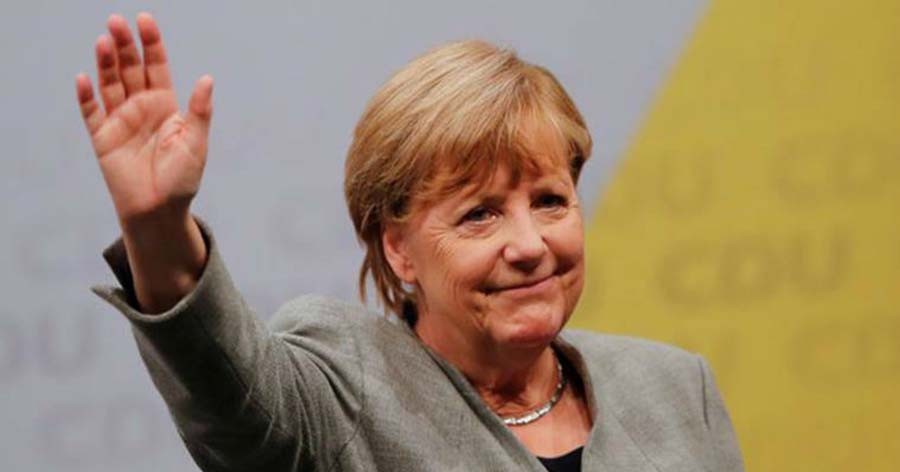
Did Angela Merkel’s stance to toughen policy on asylum seekers lead her to score a historic win?

Germany went to polls on September 24 in an historic election. The election was termed historic for the many trends it has highlighted.
First, German elections 2017 were a test of the political durability of Angela Merkel’s politics and policies. Second, the elections were a referendum on her open-door asylum and immigration policy which let in about a million refugees in 2015 against the opposition of other European leaders and German parties, including her own sister party, the Christian Social Union (CSU). Third, the elections were also a barometer of the success and future of the new leader of the Social Democratic Party (SPD), Martin Schulz, who gambled when he resigned from the presidency of the European parliament to re-enter domestic politics. Fourth, the elections were also closely watched for signs of electoral acceptability of the far-right Alternative for Germany (AfD), which has made waves in recent years by being anti-European, pro-nativist and anti-immigration.
The election results broadly confirmed these trends in varying degrees.
The Christian Democratic Union (CDU) and its Bavarian sister party, Christian Social Union (CSU), the block of right wing conservative parties, led by the current and three-time chancellor, Angela Merkel, won the largest number of seats in line with the last opinion polls before the election day.
The party gained 33 per cent vote as opposed to 41 per cent 2013. While the CDU has emerged as the largest party with slightly reduced vote, it seems to have lost support among some of its core voters.
Nonetheless the result confirms a fourth term for Angela Merkel as the chancellor -- a historic achievement for her by any standards.
Merkel’s success also shows that she managed to control the negative fallout, to some extent, of her open-door immigration policy by toughening up the policy on asylum seekers.
The Social Democratic Party (SPD) did not perform as well as was expected under its newly rejuvenated leadership of Martin Schulz. The SPD gained 20 per cent votes which is an all-time-low for the party after the World War II. This was poor performance for the SPD which surged in ratings after Martin Schulz assumed the leadership. However, the much-anticipated debate between Merkel and Schulz did not help lift the fortunes of the party any further as the latter performed too poorly on the day.
The poor showing of the SPD has raised serious question about the future of both the party and its new leader. Like the UK, where the Liberal Democratic Party was badly hurt by its partnership with the Conservative Party in a coalition government of 2010, the SPD seems to have paid the price for its coalition with the CDU. Taking cue from the election result, the party has decided to sit in the opposition and build up its battered credentials from the opposition benches.
The performance of the far-right party, the AfD was the real surprise. Formed only in recent years, the party has steadily made corrosive inroads into the electorate. The party is openly anti-EU, anti-immigrants, anti-Islam and pro-nativist. The party has made huge political capital out of Merkel’s open-door immigration policy. The upshot has been its shocking 12 per cent share of the vote, making it the third largest party in the parliament (Bundestag).
The advent of the party to the parliament is a worrisome sign, given Germans’ past exposure to Nazi ideology. Immediately off the mark after the election, the party is calling for an inquiry into Merkel’s asylum policy. The AfD is set to polarise politics on the right flank of the CDU, delivering a massive blow to consensual style of politics. However, the rise of the party is in line with the prevailing EU trends, where the far-right racist parties are coming into the mainstream EU politics, like the National Front in France.
The other big winner of the election is pro-business Free Democratic Party (FDP). The party believes in free market and economic liberalism. A part of the various coalitions over decades, the FDP was ejected from the parliament in 2013, after failing to meet the five per cent threshold to enter the Bundestag. The party, with 10 per cent of the national vote, is back in the parliament and set to be a strong contender for the coalition government. It owes its fortunes to its new leader Christian Lindner.
As for the parties of the left, Die Linke has managed to garner nine per cent vote. The party has done respectably well, increasing its share slightly over its 2013 vote. The party was originally formed out of the SPD which was considered too neoliberal under Gerhard Schroder leadership (like the Labour Party of the UK under Tony Blair). The party is positioned to the left of the SPD and has strong presence in East Germany.
The Green Party also did well securing by nine per cent vote, placing it in a pole position to form future coalition.
The latest election results reflect a fragmented German political system -- with the combined vote of two major parties, the CDU and SPD securing over 50 per cent vote and rest of the vote divided between seven small parties in the Bundestag. This does not augur well for stability of the political system which has delivered assurance to the people of Germany. It is too early to predict the final shape of the government as the process of coalition forming takes months.
With the SPD ruling itself out of the grand coalition, the CDU has limited options to cobble together a coalition government. The most likely coalition arrangement being touted by political analysts is that of the Jamaican coalition composed of CDU, FDP and the Greens, the party colours conforming to the black, green and yellow colours of the Jamaican flag.